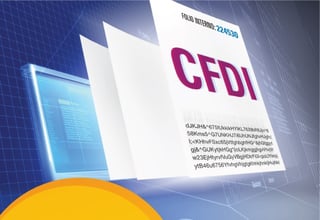
What is CFDI?
CFDI, stands for Comprobante Fiscal Digital por Internet, and it is the electronic billing established by the Mexican federal tax code. It has been mandatory for companies that do business in Mexico since 2011. It's the mechanism the Mexican government uses to make sure it is receiving accurate payments.
What kind of control or benefit do Mexican authorities look for by implementing a Foreign Trade Complement?
Although electronic billing was already issued in Mexico since 2011, the information in the documents prepared for foreign trade (COVE, Proforma, Pedimento) was not linked to internal taxes therefore, it was decided to implement a Foreign Trade Complement to the CFDI to achieve this informational exchange between tax authorities, by means of the internet.
Who Makes Use of This Process?
Objectives and Scope
- That the tax authorities of the USA and Canada can make use of an electronic invoice issued by the Mexican exporters to verify the taxpayer's tax identity.
- To use in the electronic invoice the tax identifier "TAX ID" for both the exporter and the importer of goods in the USA and Canada.
- That the tax or customs authority, recipient of the merchandise exported from Mexico, can verify the authenticity and legality of the operation
Evolution of Tax Billing in Mexico
Information Included in the Foreign Trade Complement
Operating Flow, What Changed?
The most important changes in the operating flow are:
- The integration of customs and complementary data for billing
- The establishment of an interface to generate the CFDI for the buyer according to the guidelines (TAX ID, address, incoterm and tariff fraction by the exporter. From SAT: verification of the TAX ID. From PAC: validation of the TAX ID.)
IF you would like to know how Casa Sauza implemented this legal requirement, I suggest you read our next blog: "Foreign Trade Complement the Tequila Industry".
Come and visit Casa Sauza and see for yourself how the modernization of our production processes delivers the purest tequila that you will find in the market.
.png?width=50&height=50&name=10.CS-Redondo%20(1).png)
 Irais Arreola
Irais Arreola